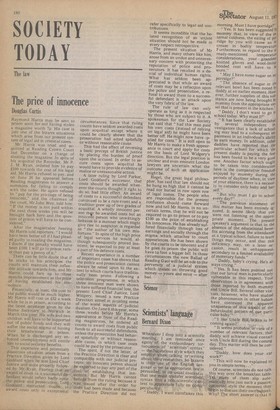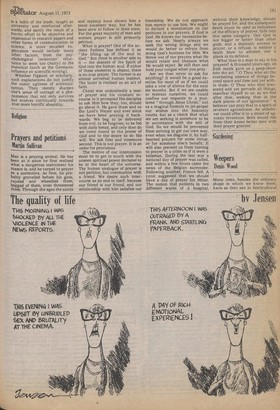Science
Scientists' language
Bernard Dixon
Whenever I drop into a scientific meeting, I am reminded once again of. the .extraordinary tortuousness of ' scientists' syntax ' — the lugubrious style which they employ when talking or writing about their researches, So bizarre is their use of the English language — yet so appropriate, one is persuaded, in its usual context— that one must transfer scientists' syntax into a non-scientific 'con-. text to appreciate fully its comic.. peculiarity:
" Daddy, I want cornflakes this morning. Must I have porridge?"
"Yes. It has been suggested b) mummy that, in view of the eg: ternal coldness, the eating of pot ridge by you will cause an lb' crease in bodily temperaturei Furthermore, in regard to the ed'
ready-mentioned temperature considerations, your • grandtne' knitted gloves and wool-lining' hooded coat will have to be worn."
" May I have some sugar on porridge?" "The' absence of sugar in the relevant bowl has been noted bY daddy at an earlier moment. How' ever, further supplies of this sub' stance are now being brought 13.Y mummy from the appropriate Yes; sel that is present in the kitchen. "Daddy, I don't want to go tO school today. Why must I?"
"It has been clearly established by several independent vestigators that a lack of school' ing may lead to a subsequent itly pairment in an individual's abilitY to earn money. In addition, other daddies have reported that the particular school for which the present daddy is paying the fees has been found to be a very good one. Another factor which ought to be taken into consideration here is the comparative freedom enjoyed by mummy during the periods of daytime when, in view of your absence, there is a necessi' ty to consider only baby and herself."
"But why must I go to school every day?"
"The previous statement on this matter has been entirely ignored. It seems likely that you were not listening at the appropriate moment. The present speaker's argument is that in the absence of the educational benefits accruing from the attendance at a typical school, failure to learn things may occur, and that this deficiency may, on a later occasion, result in unhappiness, secondary to a limited availabilitY Of monetary funds."
"Daddy, baby's crying. He's always crying,"
'Yes. It has been pointed out that our larval man is particularly vulnerable in this respect. Your observation is in agreement with those reported by both mummY and Uncle Bill. Several other visitors, however, who have studied the phenomenon in other babies, have contested the apparent uniqueness of this aspect of the behavioural pattern of our particular baby."
" I like Uncle Bill, When is he coming again?"
" It seems probable, in view of 3 number of relevant factors, that daddy will achieve visual contact with Uncle Bill during the coming day. This matter will then be considered."
"Daddy, how does your car work?"
"This will now be explained to you in simple terms ..."
Of course, scientists do not talk this way over the breakfast table. Yet many of them slip automatically into just such a passive, contorted style the moment they begin to discuss their owritsu,bject. Why? The short answer is that it
is a habit of the trade, taught at university and reinforced afterwards, and partly the result of a frantic effort to be objective and impersonal in research papers and other forms of communication in science. A more detailed explanation would include many other factors, from the psy
cholological (scientists' reluctance to seem too chatty) to the historical (such as the Germanic Influence on scientific writing).
Whether flippant or scholarly, such explanations do not justify the comic ugliness of scientists' syntax, They merely sharpen one's sense of outrage at a phenomenon that not only survives but evolves continually towards ever more horrific absurdity.



































 Previous page
Previous page